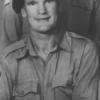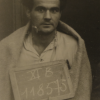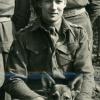After Arnhem.
24th and 25th October 1944 .
After a nerve racking lorry ride along the treacherous Arnhem- Nijmegen road, pitch black and no lights, we arrived at the Hospital in Nijmegen. A meal and bed then at first light kitted out with a uniform, a doctor check over and a debriefing before immediate transfer to the nearest aerodrome and plane to the UK.
My unit still in complete disarray was based at WRAGBY all our gear had been transported from GLASTON VILLAGE and nothing had been sorted since the Arnhem return, so my personal kit was located including my best uniform. Leave was immediate and phone calls to nearest and dearest involved many tears for I had been posted missing believed captured.
October 1944 - May 1945.
Slowly returned to full army life, training and amalgamating within units to produce full fighting units although only at half division strength. Our proud 4th Squadron was no more but we joined with those remaining in the 1st Squadron.
We trained for action in Europe as our forces advanced into Germany and had one or two STAND BY's i.e. (prepare to drop). Early in 1945 [5th/6th December 1944] those men available in the 1st Airborne Division were transported to the Guards Barracks opposite Buckingham Palace and the following day march to and into the Palace to watch those men receiving medals for action at Anthem, this was a very proud moment, followed by 72hrs leave.
Late April - early May we began training for a drop action onto an enemy aerodrome, and confined to barracks then told the drop was in Norway code name "DOOMSDAY" (after Arnhem we were not amused).
The Liberation Of Norway 8th May 1945.
The Squadron was briefed for DOOMSDAY on 8th May this being VE Day, and confined to camp, no celebrations. The end of the war in Europe changed the plans and instead of dropping in Norway we actually landed on Stavanger aerodrome on 12th May at this time I was in 1 Troop. We were dispatched to the train station and took off for Kristiansand right in the south of Norway. We received a wonderful welcome from the Norwegian people everywhere we went. Our accommodation was the best hotel, complete with all the services (my introduction to having a duvet on my bed) My job at this time was driving Captain Brown our Troop Commander, we had the task of travelling along the coast towards Oslo, finding German locations and minefields. Half our troop used small boats to patrol the coast bay by bay and we met up at each coastal village.
Mine fields were of course cleared by the Germans who used their own plans of how the field was laid. The Germans cleared a field and then had to walk in line across the field to prove it was clear. This method proved fatal for many Germans and we were instructed to use other methods in future. I was not personally involved in mine clearance thank goodness.
No 1 Troop next moved well North to BERGEN a most beautiful harbour, again we had a wonderful welcome. Much of my time was spent sun bathing and swimming, on call for Captain Brown to travel about he also had little to do at this time. Mid July and I am selected to take part in the film. "Theirs is the Glory" the story of Arnhem and to be made among the actual ruins of Arnhem and Oosterbeek, just one year after the battle.
Along with approximately 100 others we are transported to Holland and billeted in barracks near the centre of Nijmegen. Many days were spent selecting those suitable for the various lead parts, the rest to be used as BODIES!!! I did have parts in it, the flame throwing, one bare backside going into the river, wounded etc. A wonderful experience.
Many days not required on set allowed me to spend hours at the very large swimming pool adjacent to our billet. Whilst at Arnhem one day we had a service and laid a special stone at "The Bridge" in memory of ALL, very moving. Filming finished in October 45.
Returning to the UK I had missed my unit going out to Palestine so given embarkation leave, ongoing, until I received notification of my posting. Mid November 1945 my instructions were to report to a holding camp near Liverpool who arranged my embarkation and being the only one in my unit put under the orders of a Captain, together with a few other single travellers. Once on board and our hammock area given the Captain put us on HONOUR to carry out any ship instructions during the journey. Before settling in I heard sailors calling for mess attendants, I volunteered. This meant I moved down to the sailor's quarters and became a waiter for the officers mess. What a good choice, good bed, good food, no army orders and I was able to give my Captain special treatment during the journey.
Early in 1945 my stepfather, a civil engineer, moved with my mother to a place called ESNA 300 miles up the Nile from Cairo. He was involved with improvement work to the Esna Barrage. Laying on my bunk one evening after the dinner in the mess, my mind wandered to my parents, who of course we were travelling towards, me to Palestine via Egypt and them in Egypt. Christmas 1945 was coming and I could only ASK, so next morning at breakfast I requested a talk with the Captain, explained my parents, who I had not seen for years!!! Were near Cairo could he arrange Christmas leave for me when we disembarked. How my request worked I'll never know, but I received a ten day chit AND train pass from Port Said to Cairo, with an approved stamp by the RTO at Port Said. The story is too long to tell how I travelled Port Said-Cairo-Esna and return, all in a very strange country and spending Christmas with my parents.
I returned to Cairo after my leave to be told the train line between Egypt and Palestine had been blown up by terrorists. Strange to say but my brother John was in the Airforce and stationed at a camp just outside Cairo. I stayed with him and phoned the Red Caps each morning to see if there were trains. I had six days with John a lovely time we had together, some of our best days.
Finally, I was on the train to Palestine and to a place called GAZA It was a very slow and long journey over desert and running adjacent to the sea. Very few people about, some goat herds etc. For a period we travelled parallel to a road and there were some army lorries, we had stopped again and these lorries turned into what appeared to be a fairly large camp site. I saw a flag flying and could not believe my eyes, for it was my Squadron's, 1st Para Flag, with no hesitation I grabbed my kit, threw open the door and jumped out leaving behind a very bewildered bunch of army lads (after all these weeks I was amongst my old army pals last seen in Norway). After a very few minutes the train pulled away leaving me, track side, in the desert, but within calling distance of the camp gate. The whole situation was so new to me, all I saw were rows and rows of tents behind double barbed wire fencing with observation towers at each corner. A road appeared to run into the camp via the main entrance guarded by troops. Within minutes there were troops running towards me, quite amazed that somebody had ‘JUMPED TRAIN’. I received a very happy reunion although the guard officer was a bit strict and I was escorted to the CO: Commanders office. Coming from nowhere I had to explain all that happened and I was allocated back to my Troop under Captain Brown.
Living under canvas to me, was no fun, sand everywhere, midges, washing and showering 100 yards away from the tent but nice and sunny and clothes to suit. Two weeks after settling in at the Gaza camp we moved to a small purpose built hutted camp half way between Tel Aviv and Jerusalem. This was a very well fortified camp due to the continuing terrorist acts being carried out against the British by the Jews. The following are some of the experiences I had whilst in Palestine early 1946.
Early one Sunday morning, "Red Alert" Troops 1 and 2 embark on 3ton lorries with jeep and trailers following and at speed we go to Jerusalem. The terrorists have blown up the King David Hotel in the heart of the city. There appears to be organised chaos and we see horrendous scenes around us. Paramedics with stretchers and ambulances attending the dead and wounded. Our job is to help move and lift as required, to recover bodies. We must also be on the look-out for any other possible chance of explosives. Not a very happy day but this was the start of terrorist action in the world as we know today. How strange the leader of that Jewish terrorist gang later became the Prime Minister of Israel!!! (The Stern Gang).
The British Authority had set up a very large Police Force, the main body being Palestinians but led by British Officers and Warrant Officers. In towns they were in fortified concrete/brick buildings but in the country they had purpose built concrete/ brick fortifications, square layout with a centre parade ground. Watch towers at each corner and a centre gate along one side. Around the whole building they had very heavy and high barbed wire coils, then a ditch, then an eight to ten yard mine field, then further coils of barbed wire. One fort just completed required the mine field to be laid and I was to help in a team of five, one officer, two Lance Corporals and two Sappers. We Sappers did the fetch and carrying and the others marked, placed and set the mines it was a continuous operation. One of the Lance Corporals remained in the lorry, checking, guarding and handing out the mines. I was in the 'fetch' leg of my help and half way back round the perimeter when we heard this explosion. The officer had set off the mine he was laying, he took the full blast and the other two escaped with only shock.
The remainder of the operation was closed down, the rest of The team returned to camp. We never did hear the final result but the word got round that LT. Kennedy was a very unhappy man.
It was a big day in my life 3rd JULY 1946 I was on night guard duty and Joe my pal sneaked a bottle of beer to me to celebrate my becoming 21 years old. BIG DEAL.
The terrorists are becoming a real problem, and we have to leave our happy little camp and move into a vast tented area with one side seaward, making it easier to guard. I have hardly unpacked and claimed my piece of desert in the tent before I felt ill, really, really, ill. In the army if you are not dead you report sick, AFTER you have packed all your gear for storage and also packed your large back pack to take to the sick bay. I did the packing bit but then collapsed and taken to sick bay by jeep. I was very yellow with jaundice and of course bad kidneys. There were a few others and we were put into an isolation ward, given special treatment and as required food. Not allowed out of bed not even to the toilet. We are told that we are bed bound until our urine is not yellow.
Compared with outside, this is quite good and when showing the slightest sign of clear urine we pop out of bed and have a quick game of "ping pong' (the isolation ward is in the games room). This immediately puts us back to yellow urine and more days in bed. Even this becomes too boring so we concentrate on getting better and we are moved to the convalescent camp on the coast beautiful sun sea and food.
Time passes and I am back in camp and on driving duties. All jeeps now have a heavy duty angle iron bar welded to the front bumper and bonnet. The terrorists had learnt the nasty trick of placing wire across roads and tracks and after a few fatalities we found the answer to be the angle irons.
One interesting trip I had was to take a trailer load of special equipment across the Sinai Desert from near Gaza to a camp in Egypt at a place called Esma Liya this being on the Sweet Water Lakes adjacent to the Suez Canal. These journeys can be dangerous on two counts, one breaking down and being attacked by Desert Arabs, two due to heavy winds you may run into a sand drift and at the speed we need to go this can cause trouble with a capital 'T' These trips are usually made overnight and in the cool. The army had a staging post on the borders of Palestine and Egypt where we checked our vehicles for oil, water and fuel plus reserves. Had a good meal and checked out at the MP's post. Setting off for my first run I had some fears being on my own, warnings of the dangers with a non stop trip to the Suez Canal some 200 miles. In fact it was a wonderful journey, miles and miles of desert, big bright moon, cruising along at some 50mph and reaching the Esma Liya camp for early breakfast. I was allowed 48hrs to rest and I met an old pal and we swam in the Sweet Water Lakes across to The Suez Canal and so across the canal, just to say I had done it I returned to Palestine this time with one of the Battalion Officers and his equipment.
My memories of Palestine are still very vivid. Roadside orange pickings, water melons, snow over Jerusalem and Bethlehem at Christmas how hot it was and how cold at night, the beauty of the country and the wicked terrible ways of the terrorists.
It was time for my demob and I returned to England via boat to the South of France then a train to the Channel. A ferry across and a train to the camp in Devizes Wiltshire and on the 17th July
1947 after four years and three months I became a civilian
Source:
Transcription of this personal account kindly created by R Hilton.
Read More




Latest Comments
There are currently no comments for this content.
Add Comment
In order to add comments you must be registered with ParaData.
If you are currently a ParaData member please login.
If you are not currently a ParaData member but wish to get involved please register.